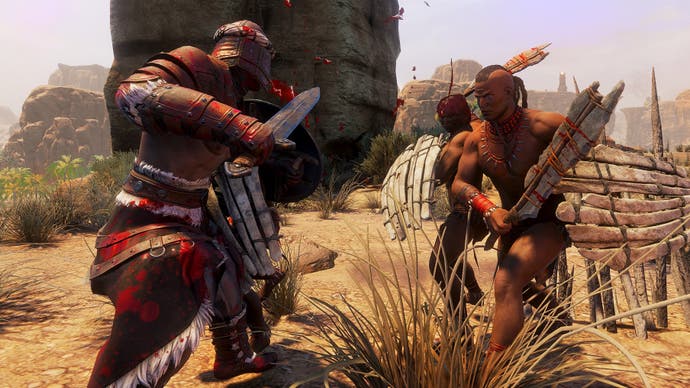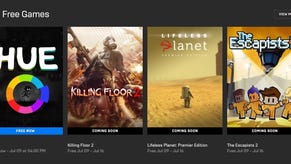Conan Exiles review - a handsomely sculpted survival game
Wanger out.
The survival game bandwagon is looking more and more like a plague cart these days, with the stillborn corpses of quickly forgotten Early Access titles tumbling to the muddy wayside with every jolt along the genre's increasingly rutted pathway. But it rumbles dutifully on, some not-quite-dead-yet deliveries still to be made before the axle inexorably splinters and the wheels fall off, sloping into decay on some forsaken hillside.
After the island horror of The Forest, the latest stopover on survival gaming's painful journey from domineering towards indifference (and, eventually, no doubt, back again) is the Hyborian Age. Devised way back in 1932, it's the fictional epoch that services Robert E. Howard's Conan adventures, making Exiles the first - and, in all likelihood the last - survival game to be adapted from an established franchise by a studio that's long been associated with it. It was Funcom of course that brought us Age of Conan back in 2009, which though not the first IP-laden game of its kind, was suitably Conan-like in its informal approach to the design of lady armour.
In line with its persistent predecessor, Conan Exiles continues the tradition for naked flesh and raw bloody combat, which may be less of a thing in a genre where avatar nudity and blunt force trauma are commonplace, but then Funcom always finds a way to play upon the fact that Conan's world will forever be out of sync with modern sensibilities. To that end Exiles succeeds in getting our hackles up thanks to its character creation options, which famously afford the ability to tweak the pendulousness of a chap's chap or a lady's lumps. What really bothers me about it however is that you can't change much else. Aside from basic options for height and muscle tone, that's your lot. If you were hoping to sport dinner plate alveoli or effect a scrotum slider that allows you to trawl the sand for edible bugs, you might want to let your berserker rage kick in about now.
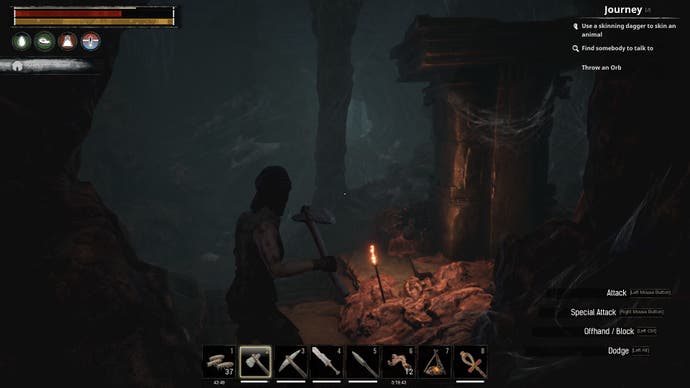
Still, being a survival game that's fresh from Early Access and by all accounts doing very nicely thank you, it's safe to assume that Funcom won't be abandoning development on Exiles for quite a while. Despite player mounts, sorcery and customisable nutsacks being pegged back for launch, the game has come a long way in a comparatively short space of time, spending just over a year as a purchasable preview when other titles have had to endure three or four winters.
If that sounds like an impressive turnaround, some credit must go to the competition, namely Ark and Rust, the two games that have clearly informed Funcom the most and to which Exiles stands as a kind of fantasy tribute. As with Ark, experience unlocks character attributes and selectable feats (the Conan equivalent of engrams), and the first stage of domination requires the establishment of a base staffed by slaves you have to break rather than dino-things you have to tame, but the process of building up resource stocks and establishing an army of guards isn't all that different to what's gone before.
Ark has more content to work through, certainly, mostly because the game has been in active development for far longer. But there's a lot to be said for Conan's more evolved presentation, as well as the understated way in which Conan's abundant lore - its factions, religions and godly end-game manifestations - have been selectively repurposed so as not to break apart the threads of survival gameplay that are woven into the early part of the game.
Once food ceases to be an issue, which is typically at around the same time as you've acquired decent armour, varied weapons and a healthy disregard for the local wildlife, the purges start. Inspired by Seven Days to Die's hordes, purges tempt forth NPC warbands that can make short work of a poorly defended structure. Thankfully players are able to raise their own NPC army to effect a defence, by capturing slaves from local settlements and breaking their will on the iconic Wheel of Pain. Sadly, thralls aren't the most convincing battlers and while they can help with crafting between purges, they are unable to source raw materials. It's a limitation, yes, but one that's due to be eliminated via a future update, which can't come soon enough.
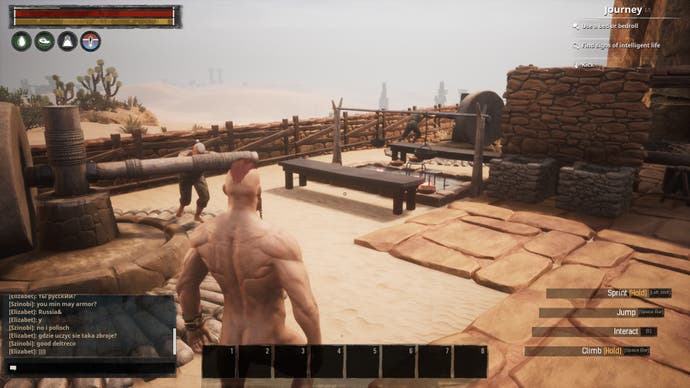
The combat system is pretty solid and robust, utilising the standard mix of a light and heavy attack, a shield block, target lock and a suite of evasive directional rolls. Dark Souls it ain't, but the weapons have a satisfying weight, connect well and damage is high, meaning that although movement can seem slow, battles feel substantial, tactical and meaningful, especially once you have grenades flying about that can be used to set a sizeable force ablaze. Sadly ranged combat is considerably less impactful and feels purposefully gimped, no doubt because the AI is considerably less able to traverse the sheer surfaces than the player, making it easy to reign down a hail of arrows upon the enemy without much threat of being hacked down. That's not to suggest the AI can't string a volley of arrows together, but ranged battles generally feel like a balancing act in progress.
While combat is bloody and brutal and end-game sieges can feel suitably epic, it's the resource gathering and crafting that comes across as the most distinct. There's a surprising amount of diversity between the standard mobs if crocodiles and hyenas and the more exclusive creatures that dwell in the game's darkest corners, while the various tiers of craft trees provide for a varied game than promotes clans to work together to ensure they have the capacity to create all the best stuff.
Erecting keeps is particularly compelling and although sections of wall, stair and ceiling don't always snap together at the first attempt, building an imposing and sturdy keep is relatively simple once the required resources are piled up and ready to go. It's the sheer verticality of being able to build into cliff faces, climb up walls and rockfaces and deploy siege engines and god powers hat bring siegecraft to life.
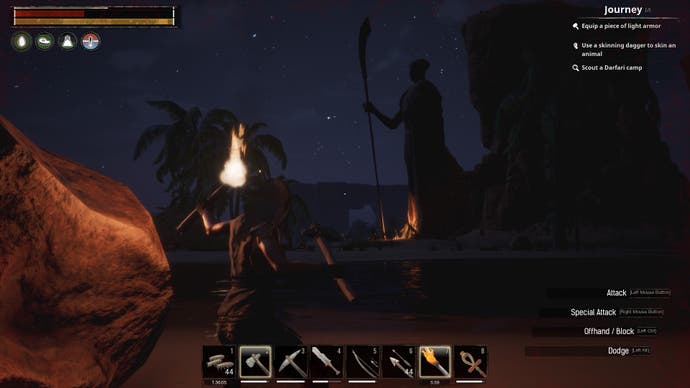
If you're a veteran of survival games and familiar with its established systems, hoping for a game that heads out in a bold new direction, Conan may disappoint in terms of its systems. Funcom has perhaps followed the survival formula more slavishly than most, which isn't going to endear it to those who know it all too well. If, however, you've been yearning for a action sandbox that does away with all the iconeering so beloved of mainstream open-worlds, you may find a lot to like. As a world, Conan's exiled realm isn't as awkwardly contrived as Ark's dinosaur playground, nor as ubiquitous as yet another post-apocalyptic wasteland. Instead it's a unique and largely tropical fantasy realm, one that holds up as a survival playground and wears its threadbare survival togs well.
Played on a busy PvP server, while Exiles often comes across like the Ark/Rust clone it so clearly is, it has the setting and combat mechanisms to set it apart. Play it as a single-player experience and it will evoke memories of Minecraft, while as a co-op game, with its respawning mobs, thinly spread content and raid-like endgame, you might just catch the glimmer of an old school MMORPG, reminding you, just a little, of when the genre was a metaverse of uncharted promise.
Whether or not these are the end times for survival gaming or the onset of a necessary period of hibernation, despite the dead weight of dozens of unfinished games and the fact that there's not a great deal left to pick from now that Conan has taken his leave, perhaps it's just as well that the genre has saved one of its best till last. If there's half the life left in it that other survival games have enjoyed, it'll be a life worth living.
